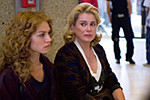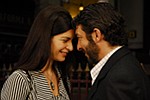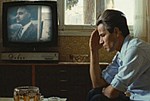 Shadows off the beaten path
Shadows off the beaten pathTHE TIME THAT REMAINS | THE SECRET IN THEIR EYES
< < F O R E I G N > >
last update 1.Jun.10
See also: SHADOWS FILM FESTIVAL
 R E V I E W B Y R I C H C L I N E
R E V I E W B Y R I C H C L I N E
prd Vincent Chui
with Lee Chi-Kin, Ben Yeung, Clifton Kwan, Guthrie Yip, Joman Chiang, Lai Kin-Fat, Sammy Wong, Tim Bo, Francis Or, Andrew Hui, Risky Liu, Gigi Wong

release US 5.Jan.10 dvd,
UK 7.Jun.10 dvd
09/China 1h37
 Sensitive and sometimes very moving, this Hong Kong drama almost loses us due to its sombre approach and disjointed structure. But strong themes and vivid characters keep us engaged as the filmmaker explores the effects of addiction.
Sensitive and sometimes very moving, this Hong Kong drama almost loses us due to its sombre approach and disjointed structure. But strong themes and vivid characters keep us engaged as the filmmaker explores the effects of addiction.
Ming (Lee) arrives at a religious rural rehab centre, where he's assigned a strict-but-understanding mentor Keung (Yip). While here, Ming has time to reminisce about his life as a sales clerk and the nice-guy customer, Yan (Yeung), with whom he started a romantic affair. But this was undermined when his new flatmate (Kwan) introduced him to the party lifestyle, including a series of men who paid him for sex. Now as he's released from the treatment programme, his past comes back to haunt him. And Keung's girlfriend (Chiang) isn't much help.
The film has a pensive tone and a gloomy sense of foreboding, with glimpses of emotional turmoil and even death right from the start. This over-serious approach is a little intense, as is the increasingly melodramatic story, which builds to a series of strangely blunt emotional climaxes. Watching all of this through Ming's naive 22-year-old eyes feels both preachy and cautionary as he encounters all kinds of new things that have the power to derail his life forever.
Fortunately, writer-director Chung has a relatively light touch, focussing on the characters rather than the controversy. This combines with Lee's understated performance to add small touches that give us a glimpse into his thoughts. And Chung also skilfully contrasts the various sexual encounters, which are depicted as obsessive, cynical and desperate, but rarely romantic. Through it all is the sense that Ming is yearning for a normal relationship, but life is too messy for him to find one.
It's refreshing to see a film explore the everyday struggle to interact with both others and ourselves, even though it's not particularly hopeful. There's striking realism here that everyone is actually selfish, making healthy relationships extremely elusive. At least we can identify with Ming's fear that no one will love him if he loses his youthful looks. Although since the film's fragmented structure isn't easy to follow, it never builds any real dramatic momentum.
30.May.10
 R E V I E W B Y R I C H C L I N E
R E V I E W B Y R I C H C L I N E La Fille du RER
La Fille du RER
prd Saïd Ben Saïd
scr André Téchiné, Odile Barski, Jean-Marie Besset
with Emilie Dequenne, Catherine Deneuve, Michel Blanc, Ronit Elkabetz, Nicolas Duvauchelle, Mathieu Demy, Jeremy Quaegebeur, Djibril Pavade, Alain Cauchi, Arnaud Valois, Amer Alwan, Benoit Soles

release Fr 18.Mar.09,
US 22.Jan.10, UK 4.Jun.10
09/France UGC 1h37

 This understated drama really gets under the skin through vivid characters and situations. Finely skilled direction and acting makes it vividly real, like an extremely low-key thriller that grabs hold and won't let go.
This understated drama really gets under the skin through vivid characters and situations. Finely skilled direction and acting makes it vividly real, like an extremely low-key thriller that grabs hold and won't let go.
Skater girl Jeanne (Dequenne) lives in a Paris suburb with her helpful mum Louise (Deneuve). When meets another skater, Franck (Duvauchelle), their romance develops quickly. And she decides to move in with him rather than take an offered job as a secretary for a legal firm headed by Samuel (Blanc), a renowned specialist in cases involving anti-Semitic violence who has a past connection with Jeanne's parents. But when things go wrong she does something that has severe consequences.
Techine's filmmaking is warm and sensuous, immediately drawing us in simply because we recognise these people and situations as authentic. And as he deepens the story, it becomes politically intriguing as well, touching on issues from internet dating to racial clashes. Techine also continually insinuates that these people are capable of making big mistakes in their efforts to find happiness and security.
The performances are shaded and natural, offering brief glimpses of internal emotions as everyone seems unsure of themselves and their effect on each other. The developments of the plot are sudden and sometimes shocking, but never sensationalised, and we really feel the impact of events on the characters. At the centre, Dequenne brings a steely vulnerability to this naive young woman whose life is punctuated by train journeys.
Meanwhile, there's a strong sense of past decisions and consequences in the tentative, delicately played scenes between Deneuve and Blanc. And side roles for Elkabetz (as Samuel's assistant and former daughter-in-law), Demy (as Samuel's son) and Quaegebeur (as their about-to-be Bar Mitzvahed son) add texture and meaning, especially as the plot develops. In some ways, there's too much going on in this film: parent-child issues, hate crimes, romantic desperation, relational fallout. But Techine gently puts us into these situations, forcing us to examine our own decisions and motives, which is all too rare in the cinema these days.
1.Jun.10
 R E V I E W B Y R I C H C L I N E
R E V I E W B Y R I C H C L I N E MUST
MUST  SEE
El Secreto de Sus Ojos
SEE
El Secreto de Sus Ojos
scr Juan Jose Campanella, Eduardo Sacheri
prd Mariela Besuievski, Juan Jose Campanella, Carolina Urbieta
with Ricardo Darin, Soledad Villamil, Guillermo Francella, Pablo Rago, Javier Godino, Carla Quevedo, Alejandro Abelenda, Mariano Argento, Mario Alarcon, Rudy Romano, Sebastian Blanco, Barbara Palladino
 release Arg 13.Aug.09,
release Arg 13.Aug.09, US 16.Apr.10, UK 13.Aug.10
09/Argentina 2h09
SECRET IN THEIR EYES (2015)
TORONTO FILM FEST
EDINBURGH FILM FEST
 Gorgeously filmed with passion and artistry, this is a provocative story of the tenacity of justice as seen through the eyes of a man who can't forget the one that got away. This is literally breathtaking filmmaking on every level.
Gorgeously filmed with passion and artistry, this is a provocative story of the tenacity of justice as seen through the eyes of a man who can't forget the one that got away. This is literally breathtaking filmmaking on every level.
Recently retired lawyer Benjamin (Darin) wants to write a novel, but is unable to shake the memory of a brutal 25-year-old murder case that challenged his sense of justice. But time got away from him, and it's only now that he's again haunted by the horribly twisted series of events. This is entangled with his relationships with two colleagues (Villamil and Francella) and the victim's equally troubled husband (Rago), plus and an ongoing vendetta that subverts justice in the name of politics.
With painterly cinematography, Campanella pulls us into the story with vivid, sensual details. We feel Benjamin's strain to imagine happy, beautiful stories rather than something violent and sinister. And this approach extends to the way Benjamin's past drifts into his present, cleverly blurring the lines between reality, fantasy and memories. This style of filmmaking makes us feel everything he feels, and at times it's almost overwhelming.
This is the evocative story of a man who spent his whole life in pursuit of justice and still feels like he has something to learn, especially if there might be truth out there still undiscovered. Through lyrical editing, it almost feels like he's getting the chance to go back in time and right a terrible wrong. And while the film grapples with weighty themes, it takes the time to create characters who are full of personality and attitude. So their internal quests and interpersonal relationships are vivid and involving.
Every performance zings with honesty and earthy humour, with Darin creating an especially powerful character in both timelines. Through his eyes we are forced to think about what we would do in the same situation: follow the letter of the law, bend the rules, go with the flow, see things from new angles or give up on finding the truth? We're reminded that the one thing we can't change about ourselves is our passion. And that we can't live through our memories.
13.May.10
 R E V I E W B Y R I C H C L I N E
R E V I E W B Y R I C H C L I N E
prd Michael Gentile, Elia Suleiman
with Saleh Bakri, Elia Suleiman, Samar Qudha Tanus, Shafika Bajjali, Tarek Qubti, Zuhair Abu Hanna, Ayman Espanioli, Bilal Zidani, Leila Mouammar, Yasmine Haj, Amer Hlehel, George Khleifi

release Isr 6.Feb.10,
UK 28.May.10, US 7.Jan.11
09/Israel 1h49
CANNES FILM FEST
TORONTO FILM FEST

 This collection of vignettes tracing the aftermath of Israel's creation in 1948 is deeply personal and often surprisingly funny. But it's so specific and artful that it's also rather impossible for non-Israelis to understand.
This collection of vignettes tracing the aftermath of Israel's creation in 1948 is deeply personal and often surprisingly funny. But it's so specific and artful that it's also rather impossible for non-Israelis to understand.
When Israel "liberates" Nazareth, one Arab family quietly stands firm. Young husband Fuad (Bakri) makes guns as part of the resistance and is constantly harassed by Jewish militia, while his wife (Qudha Tanus, then Bajjali) tries to make life as normal as possible for their young son Elia (Hanna, Espanioli, then Suleiman). Over the years the situation changes, but their home remains constant, as do their colourful neighbours. And for every act of violence, there are at least five absurd events that keep things in perspective.
The film is made up of scenes from 1948 to the present with echoing themes and characters but no over-arching storyline. As a result, the movie never builds much momentum, although it would certainly resonate strongly for those familiar with the situation. For the rest of us, most references are obscure (if that), and many of the clearly symbolic elements remain elusive. So it feels somewhat random in its scattershot approach as it meanders through scenes that repeat or echo each other like poetry.
Some of these sequences have real power, such as when a tank follows a man as he empties his bins while talking on his mobile phone, or when armed police try to disperse a Ramallah rave. Repeated scenes in which a neighbour douses himself with petrol then tries to light it, or when patrolling soldiers harass two night fishermen, have tense subtext even though the film maintains a slapstick tone through the black humour and disturbing violence.
In the later scenes when Suleiman plays himself, he adds a Chaplinesque quality. This has been there all along but becomes more noticeable through this middle-aged man's passive, curious stare. This style of performance (and filmmaking) extends right through the movie, given the whole thing a period feel. Even if it never quite comes together for most audiences, the film has historical value as Suleiman beautifully depicts these momentous events as seen through his own childhood eyes.
12.Apr.10


See also: SHADOWS FILM FESTIVAL
© 2010 by Rich Cline, Shadows
on the Wall
